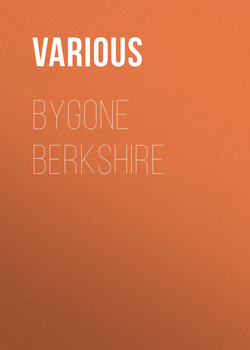Bygone Berkshire

Реклама. ООО «ЛитРес», ИНН: 7719571260.
Оглавление
Various. Bygone Berkshire
Preface
Historic Berkshire
Windsor Castle
Wallingford Castle
Cumnor Place and Amy Robsart
Alfred the Great
The Guilds of Berkshire
The Scouring of the White Horse
The Last of the Abbots
Siege of Reading
Reading Abbey
The First Battle of Newbury, 1643
The Second Battle of Newbury, 1644
Binfield and Easthampstead, 1700-1716, and the Early Years of Alexander Pope
Berkshire Words and Phrases
Bull-Baiting in Berkshire
Отрывок из книги
Berkshire has played an important part in the annals of our country, and been the scene of many stirring events in English history. For eight hundred years it has enjoyed the proud distinction of being the Royal County; Windsor Castle, the ancient home of the kings and queens of England, is within its borders, and it has shared the fortunes and misfortunes of the Royal House. Indeed, its proud distinctive title may be traced to a period more remote than that of the building of the Castle by the Plantagenet Kings; Alfred the Great was born in Berkshire, and there were royal palaces in Saxon times at Farringdon and Old Windsor. Here the Confessor King oft resided. Here the Conqueror hunted the tall stags whom he loved "as though he were their father." Hence from Saxon times to the present day Berkshire has deserved its royal title, and has been pre-eminently the county which kings delight to honour.
When the tide of Roman conquest flowed over Britain the old inhabitants of our county soon felt its force and yielded to the storm. Their lands then formed part of the Roman province of Britannia Prima. Instead of incessant tribal wars and rude barbaric manners, the conquerors established peace and civilisation. Silchester became the centre of their rule in this part of the country, and instead of the pit dwellings and rude huts of the natives they erected their stately villas and their forums and bacilicas, the ruins of which, after a burial of many centuries, are now being disinterred. This city lies just beyond the confines of Berkshire, although the Amphitheatre, where Roman gladiators fought, and where, doubtless, as at Rome during the Decian Persecution, Christians were doomed to death, "butchered to make a Roman holiday," is within our borders. Silchester was the centre of our system of Roman roads. Other Roman towns in this district were Spinæ (Speen, near Newbury), Thamesis (probably Streatley), and Bibracte (possibly Wickam Bushes, near Easthampstead). A road ran from Silchester to Pontes (Staines), and another from the same place to Spinæ. Romano-British remains have been found in abundance at Wallingford, Compton, Reading, and other places; and Roman villas discovered at Maidenhead, Hampstead Norris, Frilsham, and elsewhere. With the Romans also came Christianity, and at Silchester have recently been discovered the remains of what is probably the most ancient ecclesiastical building in the country, the forerunner of the many beautiful churches which adorn our county.
.....
Shouts of joy welcomed the restoration of the monarchy in 1660. In Reading there were great rejoicings, and a stage was set up in the market-place for the purpose of issuing the royal proclamation, and the King's arms were engraved on the mace. The Revolution of 1688 caused some commotion in Berkshire. In the cellars of Lady Place, at Hurley, many anxious meetings were held, which resulted in the advent of the Prince of Orange. Lord Lovelace, its owner, was one of his principal adherents, and he and his twenty followers were the first to strike a blow for William. It was entirely unsuccessful, and a prison cell at Gloucester rewarded his rashness. At Hungerford, William met the King's commissioners, and then marched on Newbury, some of his forces being also present at Abingdon. Some fighting took place at Hungerford between the Irish troops of King James and the soldiers of William, who were entirely victorious. Reading also was the scene of fighting. The Irish soldiers quartered there threatened to massacre the inhabitants, who requested succour from William. A body of three hundred men were sent to their relief, and a sharp engagement took place in the market-place, in which the Prince's troops were victorious. The anniversary of the "Reading fight" was celebrated with great rejoicings for many years. There was some slight opposition to the progress of William's troops at Twyford and Maidenhead, but ere long London was reached, and William proclaimed King. There were not a few who sighed after the exiled sovereign, and many who could not reconcile it with their consciences to take the oath of allegiance to the new king. Shottesbrooke Manor-house was the resort of many famous non-jurors, amongst whom were Bishop Kenn, Robert Nelson, Francis Cherry, Dr. Grade, and Henry Dodwell.
From this period the course of our county's history runs smoothly on, and is absorbed in that of England. Each ruined keep and moss-grown pile, each village green and scattered hamlet, has a history all its own, often buried beneath the weight of years, and little heeded by the present race of pilgrims.
.....